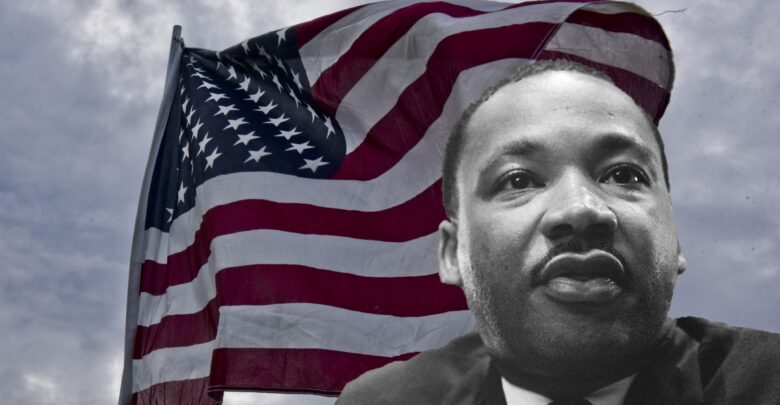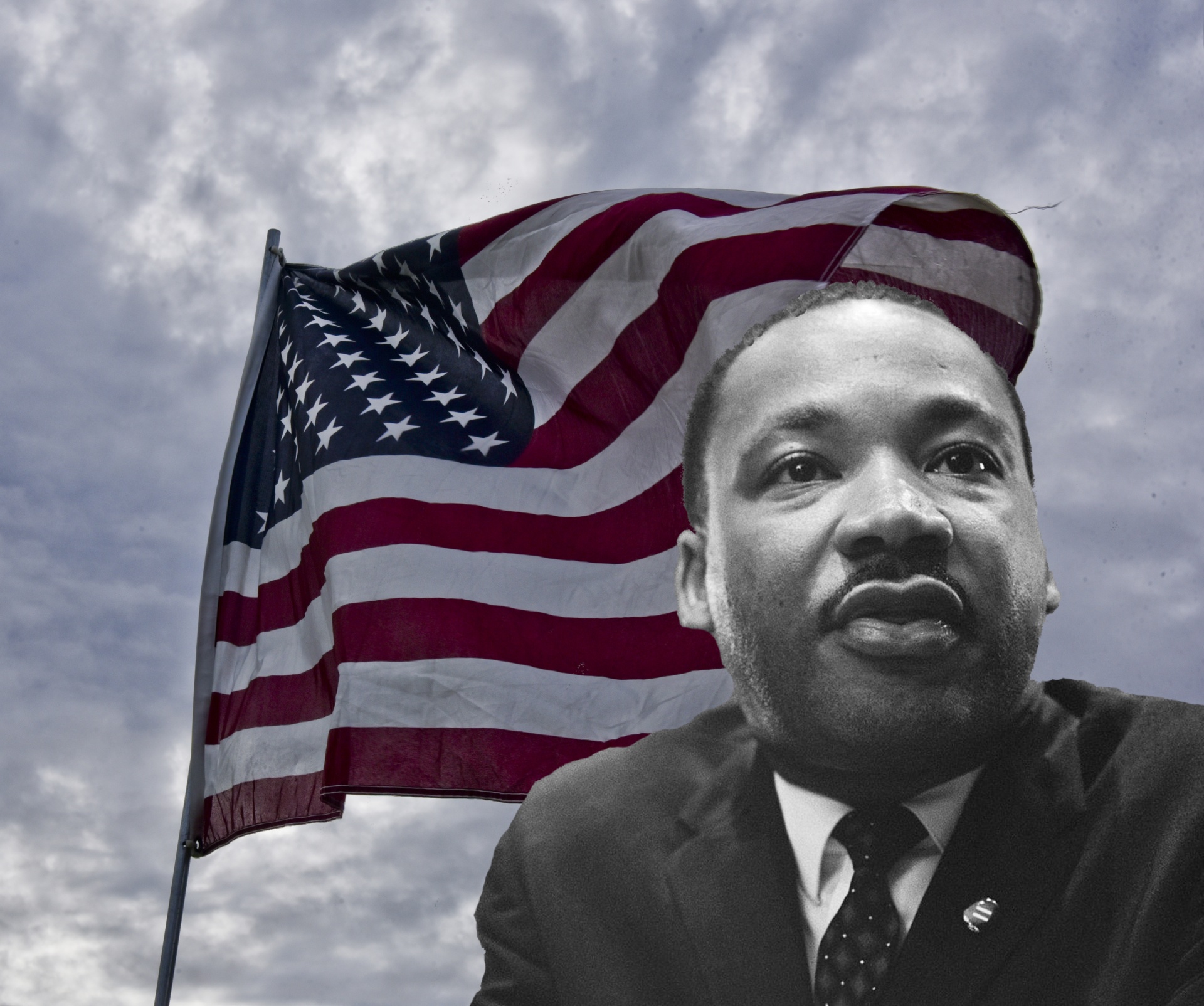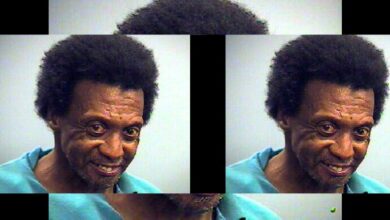Martin Luther King Jr – Africa Facts Zone

King led the Southern Christian Leadership Conference as one of his numerous endeavors (SCLC).
He was instrumental in eliminating the legal segregation of African American citizens in the United States and in the development of the Civil Rights Act of 1964 and the Voting Rights Act of 1965 through his advocacy and motivational speeches.
Among many other achievements, King received the Nobel Peace Prize in 1964. One of the most significant and inspirational African American leaders in history, he is still recognized today.

Martin Luther King Jr Early Years
Martin Luther King Jr. was the middle child of Michael King Sr. and Alberta Williams King. He was born as Michael King Jr. on January 15, 1929.
The families of King and Williams originated in rural Georgia. A.D., the grandpa of Martin Jr. Williams spent several years as a clergyman in a rural area before relocating to Atlanta in 1893.
With just about 13 members, he took over the ailing Ebenezer Baptist Church and turned it into a strong congregation. He wed Jennie Celeste Parks, and Alberta was their only living child.
Sharecroppers from a struggling farming hamlet made up Martin Srfamily. .’s In 1926, following an eight-year relationship, he wed Alberta. The newlyweds relocated to Atlanta to live with A.D.
After his father-in-law passed away in 1931, Martin Sr. took over as pastor of Ebenezer Baptist Church. In honor of the German Protestant religious figure Martin Luther, who was also a famous pastor, he took the name Martin Luther King Sr. Michael Jr. eventually took on the name, following in his father’s footsteps.
King had two siblings: Alfred Daniel Williams King, his younger brother, and Willie Christine, his elder sister. The King family experienced a safe and caring upbringing.
Martin Sr. was more of an enforcer, while his wife’s kindness effortlessly counterbalanced the father’s harsh hand.
King’s parents definitely made an effort to protect him from bigotry, but they were unable to do so. Martin Sr. campaigned against racism not only because his race was victimized but also because he believed that racism and segregation were against God’s plan.
Martin Jr. was deeply affected by his stern disapproval of his children having any notion of higher class.
Also Read: Khaby Lame Net worth, Biography, House & Cars
Martin Luther King Jr School & Baptizm
King started attending public school at age five while growing up in Atlanta, Georgia. He was baptized in May 1936, although he seemed unmoved by the ceremony.
King was 12 years old when his grandma Jennie passed away from a heart attack in May 1941. King found the incident to be particularly upsetting since, against his parents’ wishes, he was out watching a parade when she passed away.
Young King allegedly attempted suicide by jumping from a second-story window of the family house after hearing the distressing news.
King was a smart student at Booker T. Washington High School, which he attended. He joined Morehouse College in Atlanta at age 15, in 1944, skipping both the ninth and eleventh years.
He was a well-liked student, especially among his female peers, but he drifted through his first two years due to a lack of motivation.
King questioned religion in general and was uncomfortable with highly emotional demonstrations of religious devotion, despite the fact that his family was quite active in the church and worship.
Much to his father’s dismay, this pain persisted throughout a large portion of his youth and originally caused him to decide against going into the ministry.
But King attended a Bible class his junior year, which helped him reaffirm his faith and gave him the idea to pursue a career in the ministry. He informed his father of his choice in the fall of his senior year.
Also Read: When Did African Americans get the Right to Vote
Boycott of Montgomery buses
On March 2, 1955, a 15-year-old girl defied the law by refusing to give up her seat on a Montgomery city bus to a white man. Then, police detained Claudette Colvin, a teenager, and took her to jail.
The local NAACP branch first believed they had a strong test case to oppose Montgomery’s segregated bus policy.
However, when Colvin’s pregnancy was later made public, civil rights activists feared it would scandalize the very devout Black community and diminish the credibility of Colvin (and, by extension, the group’s work) in the eyes of sympathetic White people.
They had another opportunity to present their case on December 1, 1955. After a long day at work, Rosa Parks, 42, hopped on the Cleveland Avenue bus that evening to head home.
On the center of the bus, she sat in the first row in the “colored” section. The white section of the bus was completely full as it made its way down its route, and then a number of more white people got aboard.
Parks and several other African Americans were ordered to vacate their seats after the bus driver saw that some white males were standing.
Parks stayed seated as the other three African American passengers grudgingly gave up their seats.
She refused to give up her seat when the driver requested her to once again. For breaking the Montgomery City Code, Parks was taken into custody and lodged.
Parks was found guilty and given a $10 fine and $4 court fee during her trial, which took place a week later and lasted 30 minutes.
Parks was detained that evening, and E.D. To organize a Montgomery Bus Boycott, Nixon, the chairman of the neighborhood NAACP chapter, met with King and other local civil rights activists.
Also Read: Yoruba Ifa Religion and the Sacred Ifa Oracle
Boycott and Protest
King was chosen to head the boycott because he was young, educated, connected professionally and via his family.
However, because he was new to the neighborhood and had few adversaries, it was believed that he would have a high level of credibility with the Black population.
“We have no choice but to protest,” King said in his inaugural speech as the group’s leader. “For many years we have shown an amazing patience, sometimes giving our white brothers the impression that we liked the way we were treated.
But we come here tonight to be saved from that patience that makes us patient with anything less than freedom and justice.”
King’s persuasive eloquence gave the Alabama civil rights movement fresh life. The African American community in Montgomery endured 382 days of harassment, violence, and intimidation as a result of the bus boycott. Homes belonging to King and Nixon were both assaulted.
However, the African American community also filed a lawsuit against the municipal legislation, claiming that it was illegal in light of the Supreme Court’s ruling in Brown v.
Board of Education that “separate is never equal.” The city of Montgomery repealed the need for segregated public transportation after losing multiple lower court cases and incurring significant financial losses.
Also Read: Inventions of African Americans
Martin Luther King Jr Christian Leadership Conference of the South
Victorious, African American civil rights activists understood that they needed a national organization to assist them organize their actions.
To harness the moral authority and organizational ability of Black churches, Martin Luther King Jr, Ralph Abernathy, and 60 other ministers and civil rights activists created the Southern Christian Leadership Conference in January 1957.
They would assist in organizing non-violent demonstrations to support civil rights legislation. King’s involvement in the group offered him a national platform as well as a base of operations throughout the South.
The group believed that granting African Americans the right to vote was the greatest way to start giving them a voice.
The SCLC organized more than 20 large gatherings in significant southern cities in February 1958 to register Black voters there. King spoke about racial concerns around the nation and spoke with religious and civil rights leaders.
King visited Gandhi’s birthplace in India in 1959 with the assistance of the American Friends Service Committee, motivated by Gandhi’s success as a nonviolent activist.
He was profoundly impacted by the trip, which strengthened his dedication to the American civil rights movement.
King’s friend and fellow civil rights leader Bayard Rustin, who had studied Gandhi’s teachings, advised him to commit his life to the nonviolent ideals.
Rustin was the principal organizer of the 1963 March on Washington and served as King’s mentor and counselor during his early involvement.
But because he was a homosexual man with purported links to the Communist Party, Rustin was also a contentious figure at the time.
Even though King found his advice to be quite helpful, many of his other supporters pushed him to keep his distance from Rustin.
Also Read: African Hairstyles’ Social Importance and Spiritual Significance
Martin Luther King Jr Letter From Birmingham Prison
King and his family relocated to Atlanta, his hometown, in 1960, where he co-pastors the Ebenezer Baptist Church with his father. King and his SCLC comrades continued to play a vital role in many of the most important civil rights conflicts of the 1960s despite their new position.
During the Birmingham campaign of 1963, when activists utilized a boycott, sit-ins, and marches to protest segregation, unfair hiring practices, and other injustices in one of America’s most racially divided cities, their doctrine of nonviolence was put to a particularly harsh test.
King wrote the letter from Birmingham jail, an articulate justification of civil disobedience, to a group of white pastors who had questioned his methods, after being arrested for his involvement on April 12.
Protest in Washington
Later that year, Martin Luther King Jr. collaborated with several religious and civil rights organizations to plan the March on Washington for Jobs and Freedom, a nonviolent political demonstration intended to draw attention to the injustices Black Americans continued to experience throughout the nation.
The event, which took place on August 28 and drew between 200,000 and 300,000 people, is seen as a turning point in the history of the American civil rights movement and a contributor to the passing of the Civil Rights Act of 1964.
“I Have a Dream” Speech Martin Luther King Jr.
The “I Have a Dream” speech, which is King’s most well-known speech and the culmination of the March on Washington, is a passionate appeal for peace and equality and is widely regarded as a masterpiece of eloquence.
He described a future in which “this nation will rise up and live out the true meaning of its creed:
“We hold these truths to be self-evident, that all men are created equal” while standing on the steps of the Lincoln Memorial, a memorial to the president who had abolished slavery in the United States a century earlier.
The speech and march solidified King’s fame both domestically and internationally; in that year, TIME magazine named him “Man of the Year,” and in 1964, he became the youngest recipient of the Nobel Peace Prize in history.
Also Read: When’s Black History Month
Martin Luther King Jr. was assassinated
Martin Luther King was killed on April 4, 1968, in the evening. King had flown to Memphis to support a strike by sanitation workers when he was shot and killed when he was standing on the balcony of a hotel there.
Following his passing, riots erupted in major cities all around the nation, and President Johnson proclaimed a day of national mourning.
James Earl Ray, an escaped prisoner and well-known bigot, admitted to the murder and was given a 99-year jail term.
Before his passing in 1998, he eventually renounced his confession and found some surprising supporters, including members of the King family.
Also Read: 10 African Names of African Divine Beings
What were the primary principles of Martin Luther King, Jr.?
King used nonviolent protest to demand equality and human rights for African Americans, the underprivileged, and all other victims of injustice.
Martin Luther King Jr. Quotes
1. Though we must expect limited disappointment, we must never give up on unbounded optimism.
2. Hatred cannot drive out hatred; only love is capable of doing so. Darkness cannot drive out darkness; only light is capable of doing so.
3. “Forgiveness is not a passing gesture; it is a way of life.”
4. “Hatred is too heavy a weight for me to carry, so I have decided to stick with love.”
5. Even when you can’t see the entire staircase, having faith means taking the first step.
6. The most annoying and pressing question in life is, “What are you doing for others?”
7. “Never give in to the bitterness’s seduction.”
8. “The day we stop talking about things that matter is the day our lives start to end.”
9. Although we may have arrived on various ships, we are now all on the same boat.
10. “Where a man stands in times of challenge and controversy, not where he stands in situations of comfort and ease, is the true test of a man.”
More Quotes
11. Change does not arrive via inevitability but rather through persistent effort.
12. The only thing that can turn an adversary into a friend is love.
13. There comes a moment when one must adopt a stance that is not politically correct nor popular or safe, but he must do so because his conscience tells him it is the right thing to do.
14. Never allow a man to make you detest him.
15. If you are unable to fly, you must run; if you are unable to run, you must walk; if you are unable to walk, you must crawl; but whatever you do, you must advance.
16.”The aim of real education is the development of intelligence plus character.”
17. “A stone of hope emerges from the mountain of sorrow.
18. “The proper moment is always present to act morally.”
19. If you can’t be a tree, be a shrub. Just be a path if you can’t be a motorway. Be a star if you can’t be the sun. For you don’t succeed or fail based on your size. Do your best at anything you do.
20. I may not make it there with you, but I want you to know tonight that we as a people will reach the promised land. “We have some difficult days ahead of us, but it really doesn’t matter with me now because I’ve gone to the mountaintop. I’ve looked over and seen the promised land.
Also Read: What is African American Vernacular
More Quotes
21. “For there is no stopping point short of victory when people become enamored with that which is right and are prepared to suffer for it.”
22. “I think that unarmed truth and unwavering love will have the last word in reality; thus, right, though momentarily vanquished, is stronger than evil, which has triumphed.”
23. True peace is the presence of justice, not only the absence of conflict.
24. Nothing is more terrible than coming across someone who is mired in length without any breadth.
25. “Absolute misunderstanding from persons with evil intent is more aggravating than a lack of comprehension at all from people with good intent.”
26. “Liars cannot survive,”
27. “Where there is not profound love, there cannot be deep disappointment.”
28.”Man must develop a strategy for handling all forms of human conflict that shuns vengeance, aggressiveness, and retribution. Love is the basis of such a strategy.
29. People eventually grow weary of being forced out of life’s July’s brilliant brilliance and left standing in the freezing cold of an Alpine November.
30. “We must cultivate and preserve the ability for forgiveness. Whoever lacks the capacity to forgive also lacks the capacity to love. Even the worst among us contain some good, and even the finest of us contain some evil. We are less likely to dislike our adversaries once we realize this.
31. “Nonviolence is an unwavering dedication to the path of love. Love is neither hollow sentimentalism or emotional bluster. It is the intentional pouring of one’s entire existence into another’s being.
More Quotes
32. “We do not create history. We are products of history.
33. “Men who voluntarily engage in rigorous, substantial thought are few. There is a nearly ubiquitous search for quick fixes and shoddy solutions. For other folks, having to think is the worst torture.
34. To stop the tide of dread, “we must erect dikes of bravery.”
35. Let’s refrain from trying to quench our desire for freedom by sipping from the cup of resentment and anger.
36. “Man must develop a strategy for handling all forms of human conflict that rejects vengeance, aggressiveness, and retribution. Love is the basis of such a strategy.
“Hate is just as harmful to the hater as it is to the hated,” says verse 37. Hatred corrodes the personality and destroys its essential wholeness like an untreated disease. Many of our internal disputes have a hateful foundation. Hate is too heavy a weight to carry, which is why doctors advise “Love or perish.”
38. “Love without power is emotional and anemic, whereas strength without love is irresponsible and cruel. Justice at its finest is power eradicating all that stands in the way of love, and power at its best is love enforcing the demands of justice.
39. “A dazzling star of love and fraternity will shine over our beautiful country tomorrow with all of its glittering splendor,” he said.
40. “We’ll equal your ability to cause agony with our ability to withstand it. Your physical force will be met by our soul force. Do anything you want to us. And you have our undying love.
More Quotes
41. “If one is just attracted to someone because they are friendly, then that person is being loved more for the advantages of the friendship than for the friend themselves.
Therefore, the greatest method to ensure that love is impartial is to love your enemy-neighbor, from whom you can only anticipate animosity and persecution instead of anything positive.
42. “You see, that’s love. Jesus says love because it is redemptive. Love has a way of expanding and inspiring creativity. Hatred is a destructive quality that breaks things apart. Love your foes.
45. “You can put a dreamer to death, but you can’t put a dreamer to death.”
49. “Freedom must be demanded by the oppressed; it is never voluntarily granted by the oppressor.”
50. “Those who stay impartial in times of major moral struggle are allotted the hottest spot in Hell.”
51. “We must learn to coexist as brothers or perish as idiots together.”
52. “What matters is the quality of one’s life, not the length of one’s life.”
53. “A true leader is not one who seeks consensus but one who shapes consensus.”
54. “The elbow of justice is where the moral arc of the cosmos bends.”





